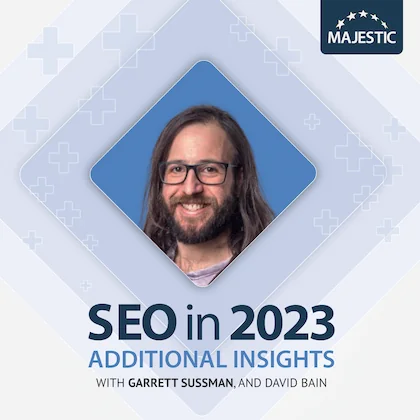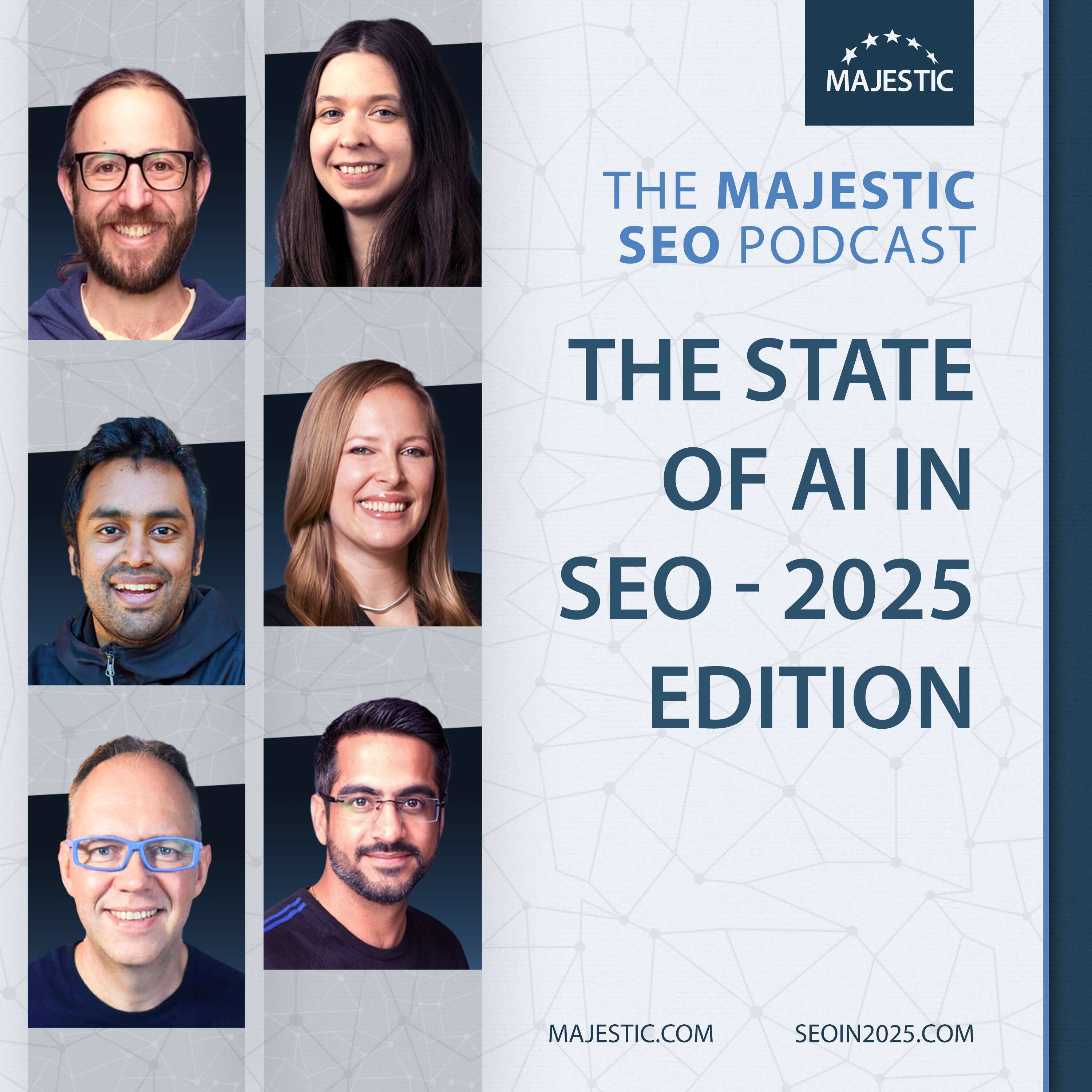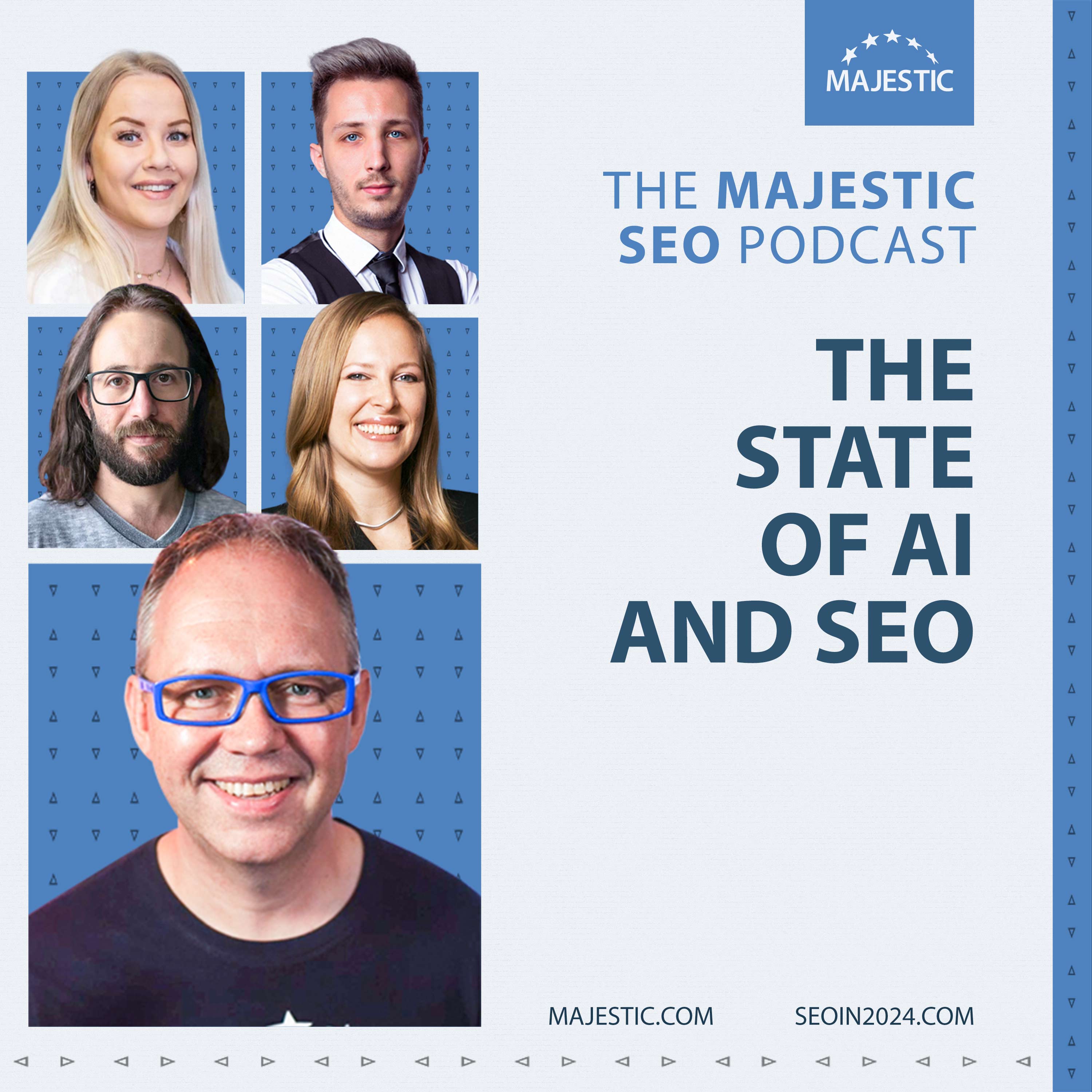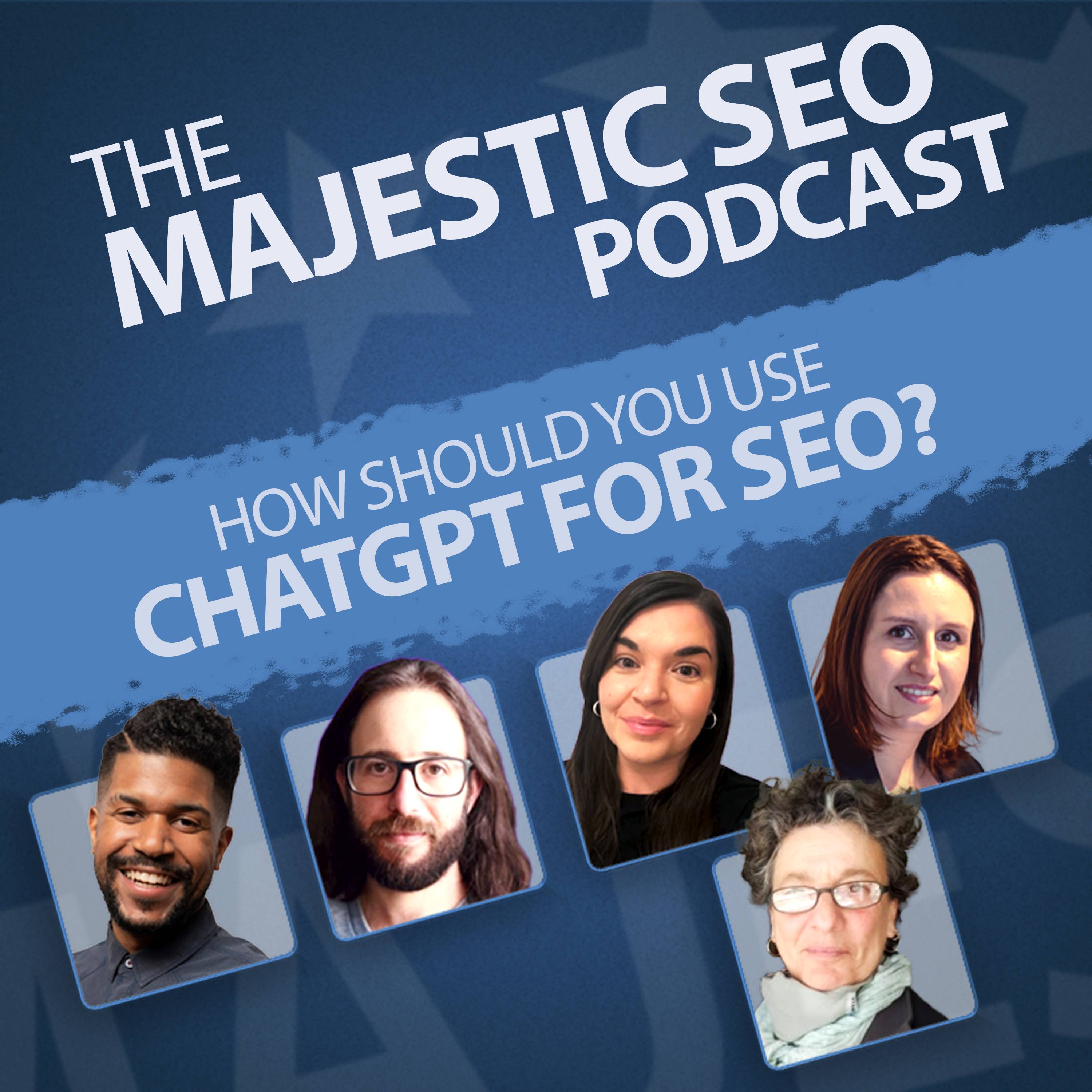-
Site Explorer
- Majestic
- Summary
- Ref Domains
- Backlinks
 New
New Lost
Lost- Context
- Anchor Text
- Pages
- Topics
- Link Graph
- Related Sites
- Advanced Tools
- Author ExplorerBeta
- Summary
- Similar Profiles
- Profile Backlinks
- Attributions
- Compare
-
Link Tools
- My Majestic
- Recent Activity
- Reports
- Campaigns
- Verified Domains
- OpenApps
- API Keys
- Keywords
- Keyword Generator
- Keyword Checker
- Search Explorer
- Link Tools
- Bulk Backlinks
- Neighbourhood Checker
- Submit URLs
- Experimental
- Index Merger
- Link Profile Fight
- Mutual Links
- Solo Links
- PDF Report
- Typo Domain
- Free SEO Tools
- Support
How to use ChatGPT for SEO
Garrett Sussman
Garrett Sussman explores the benefits and drawbacks for SEOs of using ChatGPT and AI for content creation and other SEO purposes.

Garrett Sussman says: “My additional insight has to do with the proliferation of ChatGPT, this whole concept around using AI generation in your content creation, and for a variety of SEO purposes.“
Proliferation is certainly the right word, even though it can be a bit challenging to say, it's the appropriate thing to say, because we're recording this in January 2023. And it was only launched last month, but everyone is talking about it, testing it, seeing what it can be used for. So what can it be used for? And what shouldn't it be used for?
“Well, first off, it's really important to understand that it is a tool, it is not going to replace writers, it is not going to replace SEOs and there are limitations to this tool. So basically, it's trained on billions of documents, the first important consideration is that it was trained on documents from 2021. So it's not for real time search, if any information has changed, it is not going to take that into consideration in its answers. Additionally, you can start using it for a variety of content purposes, for idea generation, for content brief generation. And then for gosh, the use cases for it are limitless. I feel like we're early on in this technology for how you can potentially use it in your SEO processes. So, it could be everything from title tag and meta description, generation to classification of keywords, creating topic clusters, for any type of schema markup generation, there's a wide variety of purposes for the tool.”
Yeah, I love how you lead with idea generation there, I think there's a wonderful opportunity just to augment what people were thinking or what other research tools are providing you with in terms of what topic you should perhaps be using. So does that mean that you're potentially against asking it a question, copy and pasting the answer and just using that as a blog post?
“Absolutely, absolutely. One other aspect of consideration for this tool is, even in the initial use of ChatGPT, they kind of give you an alert that it's not 100% factually accurate all the time, it still makes mistakes. It's in its early development. So, it's one of those situations where it's a trust, but verify. You should never, ever, ever, ever, under any circumstance, publish raw AI content output, because it might have wrong information, it might, you know, not make sense in certain places. In essence, what it's doing is it's trying to predict whatever the next word is that it would expect someone to write based on these millions of Doc documents, you know, that it's been trained on, because it's machine learning, right? So ultimately, you need to always look at it and edit it ruthlessly before publishing anything.”
So if it's trained on what it expects someone to naturally write next as the next words, then, how come there are tools out there that can identify that 100% chance that this piece of text has been written by AI?
“Well, to that point, it can kind of identify those same types of, algorithmic, you know, language learning models, these large language models, that it's basically doing the same thing. There's confusion as to whether or not Google can identify AI generated content. And it absolutely can because it's all machine learning, it's the same sort of thing. So, basically, it's trying to identify whether humans have these aspects of randomness in their writing, unexpected, unpredictable, whether it's phrases or nuances in their linguistics. And ultimately, the tool, the algorithm can identify whether or not that is the case, whether it's a robot or a person.”
Now, one piece of chatter I've seen on Twitter recently, is the SEO community or some people in the SEO community suggesting that perhaps actually, we can add some snippet of code to a webpage to actually show Google that this web page incorporates or was generated by AI. What are your thoughts on that?
“Well, I think it plays into some of the recent developments of Google with EAT. And now EEAT, in terms of expert expertise, authoritativeness and trustworthiness. Google isn't necessarily against artificial intelligence generated content, it wants to make sure that the content is quality and that the content is helpful, that it's useful. And so, whatever the content is, if it's actually been edited, or verified from an expert or an editor, then that is considered acceptable. Now, we all know Google says one thing and how the results are ranked will fluctuate. And it's not always the case. But early on, at least what they're saying from a communication standpoint is, that's absolutely fine. As long as it's helpful, and not just primarily for the purpose of ranking in search engines.”
Taking you back to something else actually, you shared a few moments ago, is, you said, first of all, categorically, absolutely, just do not take raw AI content and add it to your website. But you also said prior to that is AI, specifically, ChatGPT could be used to generate titles and meta descriptions. Is it reasonable for a big website with lots of pages just to take that raw content without actually manually checking it and using it to generate titles and meta descriptions?
“You probably should not. I think it is one of the things with these types of tools, because that's the dream, right? To be able to scale and save money and resources and time, to be able to use this effectively. And with such short content, that might be less risky. But I would always say that there's the potential that if it's not actually edited by a human, then it could be problematic. That said, there are definitely still situations where the robots, the AI generated content will actually be better than a really poorly written human content. So, it's not to say that there aren't situations where AI content can actually be human written content, in the sense of rankings. I would just say, it's always going to be a best practice, not to assume that the generated content is perfect, or really well written.”
But maybe it might be reasonable to suggest to a manager or an SEO manager of a large site to do a split test, maybe 50 URLs use the titles that have been automatically generated without being edited at all, 50 human edited ones, similar kind of pages in terms of authority, traffic, things like that, and see which one wins. Is that a reasonable suggestion?
“As SEOs we always want to test. I think that's a great idea. And there's nuances to each site, what might work for your site, isn't necessarily going to work for other folks’ site. So yeah, test for yourself, see if that works. I think there's one of those things with SEO. I'm not necessarily an advocate for what's considered a Blackhat, SEO, any tools that are trying to manipulate the system for better rankings. That said, a lot of tactics work until they don't. As I was saying, at the beginning, we're at the nascence of this technology, it's only going to get better. I think where we're at now is going to look far different in 3, 5, 10 years. There's already talk about GPT 4, which is the next version of this tool that's been trained on a trillion plus different parameters, it's going to make this version look like child's play. I'd say the most important takeaway is whether or not you're using it now. it's important to adopt and learn the technology, because this isn't like crypto or blockchain or any of those technologies or even Google Glasses that was like a flash in the pan, temporary, trendy sort of thing. I think this is here to stay, it's fundamentally going to change the way we create content going forward.”
I'm just looking forward to the day when I can say: AI, listen to this podcast episode and write me some show notes.
“Well, watch out because I mean, you talked about the deep fake. There are all sorts of ethical issues, ultimately, where I'm saying, oh, I want to do a podcast with David Bain, but he's busy so I am just going to have the AI create the episode for me using your voice.“
We're nearly there. Yeah. There are tools out there that can certainly create voices which sound real to me, which are quite incredible, really.
“Yeah, it's going to be interesting, the whole debate around intellectual property, in terms of using those likenesses and being these tools responsibility to put watermarks or protections in place for IP. That's not something that's really being touched on quite yet.”
Are there any other AI content tools that you'd like to talk about, that you'd like to recommend? Because obviously, we've been chatting about ChatGPT. That's something that's just been launched relatively recently. We've had other AI content tools that have been available for maybe a couple of years or so. Is there anything that's catching your eye at the moment?
“I think there are actually some interesting ones. Now, naturally, any of the AI generation tools like Jasper, Copy.ai, are using a lot of OpenAI technology for content briefs, which is another use case that I think is incredibly valuable. Frase and Surfer SEO are great AI tools. And then on the other side of things, if you are going to be using AI generation tools, and you want to ensure that it doesn't come off as AI generated content, Originality.AI is a great detector to look at the content and say with how much percent certainty is this made by a person versus a human. Because when we're looking at editing that content, that's kind of part of the goal there, not only making it factually correct and making it relevant and making it timely in real time, but also ensuring that it looks like it's coming from a human.”
If there's a content writer that's listening to this at the moment, what can you do to future proof their earning capacity?
“So, I would learn editorial skills, you know, being able to structurally, grammatically, thematically edit content. I would learn journalistic skills, one of the big things is going to be able to add subject matter expertise that can't be necessarily easily pulled from an AI generated tool yet. So that might be interviewing, the ability to find the right subject matter experts, and incorporate that into the content. I think those two skill sets are going to be really important. And then ultimately, prompt engineering, the skill set to be able to communicate exactly what you want the AI to produce. Just because we can ask AI to do anything, doesn't mean we're not necessarily great at asking it for the right things. That's going to be a skill set in its own right.”
Do you think AI created content is actually going to increase the value of video content over the next couple of years?
“Well, I think that video content continues to be difficult, because it requires a ton of resources. And companies that are doing it well have a competitive advantage right now. But we need to think of AI generated content isn't just text. There's already, which we didn't even get into, AI generated image content, and there is already AI generated video content out there. That is actually going to be easier to produce in the next three to five years, and more people will be doing that and saturate in that as well. So, video content will have the same issues the text content has.”
You have shared what SEOs should be doing in 2023. So now let's talk about what SEOs shouldn't be doing. So, what's something that's seductive in terms of time, but ultimately counterproductive? What's something that SEOs shouldn't be doing in 2023?
“I actually tapped into it a little bit during the conversation, but ultimately, it is producing that raw unedited content from AI generation, it is very tempting. We've seen a lot of success with programmatic SEO, which is basically creating a template and a format to generate a ton of pages at scale. And there is some value in doing that because we're also adopted by scale. That said, you should never really produce this unless it's really simple, like the title tags, but for the most part, you really shouldn't be just, unabashedly publishing raw, unedited AI generated content.”
Garret Sussman is the Demand Generation Manager for iPullRank, and you can find them over at ipullrank.com.
Also with Garrett Sussman
Choose Your Own Learning Style
 Video
Video
If you like to get up-close with your favourite SEO experts, these one-to-one interviews might just be for you.
Watch all of our episodes, FREE, on our dedicated SEO in 2023: Additional Insights playlist.
 Podcast
Podcast
Maybe you are more of a listener than a watcher, or prefer to learn while you commute.
SEO in 2023: Additional Insights is available now via all the usual podcast platforms
 SEO in 2023
SEO in 2023
Catch up on SEO tips from 101 SEO experts in the original SEO in 2023 series
Available as a video series, podcast, and a book.
Could we improve this page for you? Please tell us









